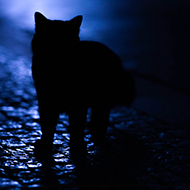RVC releases research on 'Croydon cat killer' mutilations

Over 400 deceased cats were discovered with mutilated bodies across London between 2016 and 2018.
The Royal Veterinary College (RVC) has released new research suggesting that the 'Croydon cat killer' mutilations were not carried out by a human.
Over 400 cats were found deceased and mutilated across London between 2014 and 2018, and many suggested that a human 'cat killer' may have carried out the mutilations. The Metropolitan Police launched an investigation, and closed it in September 2015, concluding that the killings had 'not been carried out by a human'.
Published yesterday (7 December) in Veterinary Pathology, the study 'Fox (Vulpes vulpes) involvement identified in a series of cat carcass mutilations', examined the bodies of 32 mutilated cats which had been brought to the police between 2016 and 2018.
The study was carried out by Dr Henny Martineau, head of veterinary forensic pathology at the RVC, with the Metropolitan Police and the Hertfordshire Police.
Dr Martineau said: As veterinary professionals, we know how difficult it is for an owner when a beloved pet passes away, particularly in circumstances that can seem mysterious or suspicious.
“While the public’s concern around the safety of their pets is totally understandable, our investigation into the deaths of these cats demonstrates the importance of an evidence-based approach to investigating incidents like this.”
Swabs were taken to analyse the bodies for the presence of fox, dog and badger DNA, and full post-mortem examinations were carried out. Dr Martineau and her team discovered a link between the mutilation and the presence of fox DNA on the cat's bodies. Puncture wounds were also discovered on some of the deceased cats, consistent with scavenging by carnivores.
Possible causes of death were identified for the cats, including predation, road traffic accidents, liver failure from antifreeze and eight of the cats were found to have suffered from cardiorespiratory disease when alive.
“The narrative of the so-called ‘cat killer’ was a good example of the human tendency to pick out what we want from data, demonstrating our inclination to stop investigating when we think we have made a major discovery or noticed a particular pattern,” Dr Martineau continued.
“It is the job of scientists – in this instance, veterinary pathologists – to identify and overcome such confirmation bias.”
Stuart Orton, East Hertfordshire chief inspector added: While the subject was a matter of much speculation at the time online, we now believe that there was no human involvement.
“I hope that this new analysis provides some comfort to the owners who previously believed that their beloved pets had been targeted maliciously.
“It also provides law enforcement colleagues with the ability to review any future investigations from a scientifically supported and evidence-based approach.”



 The RCVS has announced a new version of its 1CPD mobile app, with enhanced features for veterinary surgeons and veterinary nurses to record their continuing professional development.
The RCVS has announced a new version of its 1CPD mobile app, with enhanced features for veterinary surgeons and veterinary nurses to record their continuing professional development.